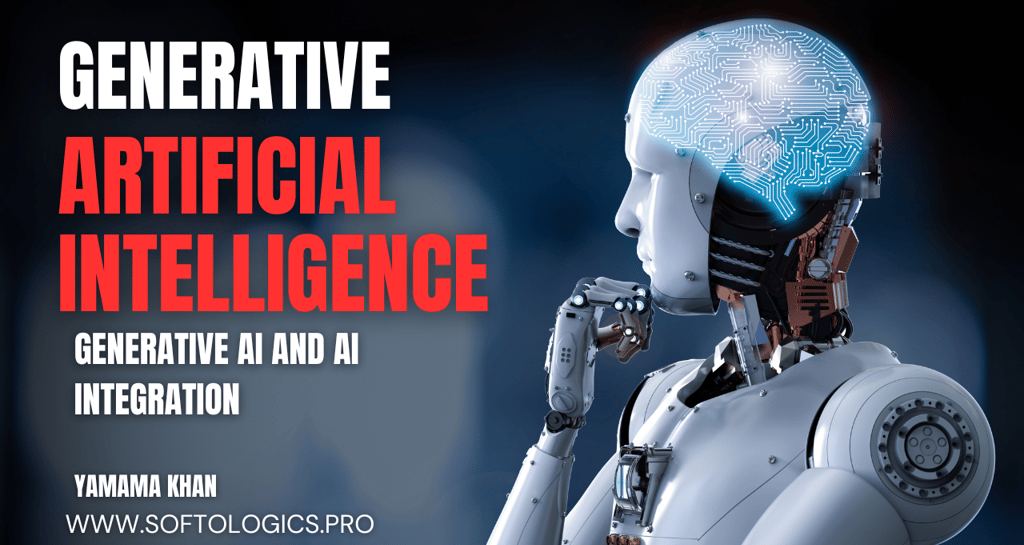Generative Ai and its integration
Blog post deGenerative AI and AI integration are revolutionizing technology in 2024, enhancing content creation, design, and everyday devices. This blog explores the impact of AI on various sectors, from marketing and journalism to healthcare and finance. It highlights the advancements in smartphones, smart home devices, and wearables, showcasing how AI is improving user experience and functionality. While the potential of generative AI is vast, ethical and privacy concerns must be addressed. Stay informed about these transformative technologies to better prepare for an AI-driven future.
DIGITAL MARKETING
Yamama Khan
10/5/20233 min read


Generative AI and AI Integration: Transforming Technology in 2024
Generative AI is rapidly transforming various aspects of technology and business. As we delve into 2024, its influence is more evident than ever. This article explores how generative AI is being integrated into everyday applications and devices, reshaping our interactions with technology. Innovation has always been at the forefront of human progress, and in today’s rapidly evolving
digital landscape, emerging technologies such as Generative Artificial Intelligence (AI) are shaping the future. With the potential to revolutionize various industries, Generative AI is set to take center stage in the year 2024 and continue to drive innovation in exciting new ways.
Let’s explore the possibilities and impact of Generative AI in the coming years.
What is Generative AI?
Generative AI refers to systems that can generate content—such as text, images, and music—by learning from large datasets. Unlike traditional AI that follows predefined rules, generative AI can create new, unique outputs based on the patterns it has learned.
Key Applications of Generative AI
1. Content Creation
One of the most notable applications of generative AI is in content creation. AI models like ChatGPT can write articles, create marketing copy, and even draft emails. This ability to generate human-like text has revolutionized fields such as journalism, marketing, and customer service.
Marketing: AI can create personalized marketing messages tailored to individual customer preferences, enhancing engagement and conversion rates.
Journalism: AI tools can quickly draft news articles based on factual data, allowing journalists to focus on more in-depth reporting.
Customer Service: AI chatbots can handle a variety of customer queries, providing instant responses and improving customer satisfaction.
2. Design and Art
Generative AI is also making waves in design and art. Tools like DALL-E, an AI model developed by OpenAI, can create images from textual descriptions, opening new possibilities for artists and designers.
Graphic Design: AI can generate logos, banners, and other design elements based on specific themes or inputs.
Art Creation: Artists can use AI to experiment with new styles and concepts, creating unique pieces that blend human creativity with machine learning.
AI Integration in Everyday Devices
The integration of AI into everyday devices is another major trend. This includes AI-powered features in smartphones, smart home devices, and wearables.
1. Smartphones
Modern smartphones are packed with AI features that enhance user experience.
Photography: AI improves camera capabilities by adjusting settings in real-time to capture the best possible images.
Voice Assistants: AI-driven assistants like Siri and Google Assistant provide users with seamless voice interaction, making it easier to manage tasks and access information.
Personalization: AI algorithms analyze user behavior to personalize app recommendations, notifications, and other features.
2. Smart Home Devices
Smart home devices are becoming increasingly intelligent thanks to AI integration.
Smart Speakers: Devices like Amazon Echo and Google Nest use AI to understand and respond to voice commands, controlling smart home gadgets, playing music, and providing information.
Home Automation: AI can automate home settings such as lighting, heating, and security, creating a more convenient and energy-efficient living environment.
3. Wearables
AI integration in wearables enhances their functionality and user experience.
Health Tracking: Wearables like smartwatches use AI to monitor health metrics such as heart rate, sleep patterns, and physical activity, providing users with personalized health insights.
Fitness Coaching: AI-powered fitness apps offer customized workout plans and real-time feedback, helping users achieve their fitness goals more effectively.
The Future of Generative AI and AI Integration
1. Business Transformation
Generative AI and AI integration are poised to transform businesses across various industries.
Healthcare: AI can assist in diagnosing diseases, personalizing treatment plans, and managing patient records.
Finance: AI models can analyze market trends, predict stock prices, and detect fraudulent activities.
Retail: AI enhances customer experience through personalized shopping recommendations and efficient inventory management.
2. Challenges and Considerations
While the potential of generative AI is vast, there are several challenges to consider.
Ethical Concerns: The creation of realistic but fake content by AI poses ethical issues, such as the spread of misinformation and deepfakes.
Bias and Fairness: AI models can inherit biases present in training data, leading to unfair or discriminatory outcomes.
Privacy: The use of personal data to train AI models raises privacy concerns, necessitating robust data protection measures.
Conclusion
Generative AI and AI integration are transforming the way we interact with technology, making devices smarter and more intuitive. As these technologies continue to evolve, they hold the promise of significant advancements across various sectors, from healthcare to finance to everyday consumer devices. However, it is crucial to address the ethical and practical challenges they pose to ensure their responsible and beneficial use.
Read Softologics blogs regularly by staying informed about these trends and their implications, businesses and individuals can better prepare for a future where AI plays an integral role in our daily lives.
